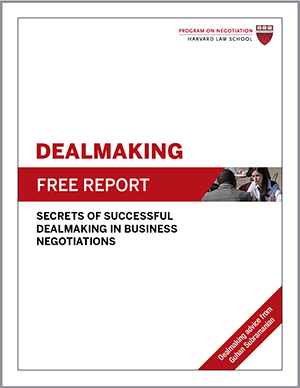
When negotiating a business contract, parties are often so focused on reaching agreement that they don’t think enough about how the deal will unfold after the ink has dried. This type of short-term thinking leads to real problems down the road. The following three business negotiation tips can help you adopt a long-term perspective the next time you try to negotiate a deal.
1. Think Multiple Steps Ahead
It’s common for negotiators to be so focused on closing the deal in negotiations that they overlook the long-term challenges of implementation, write Danny Ertel and Mark Gordon in their book The Point of the Deal: How to Negotiate When Yes Is Not Enough (Harvard Business School Press, 2007).
This type of short-term thinking often limits us from considering the various eventualities that could unfold down the line. Diagramming potential outcomes with a decision tree is one way to bring long-range outcomes into focus. And Ertel and Gordon write that managers can encourage farsighted thinking by (1) having negotiators articulate how their proposed business contract advances the organization’s long-term interests and (2) linking financial bonuses to progress during the early years of deal implementation.
Finally, by adding “if, then” contingencies to a business contract, parties can agree to disagree by building incentives and penalties into the contract based on their differing predictions.
2. Take All the Time You Need
Negotiators sometimes feel pressured to close a deal at lightning speed. Yet even as you approach the problem with intensity, there is value in negotiating your business contract more methodically.
To see why, let’s look at an extreme form of crisis negotiation: hostage standoffs. Consider that the perpetrators in these situations tend to be people who have “snapped” because of a personal crisis and taken hostages on impulse. They are likely to be in a volatile emotional state when the crisis begins, but their rage tends to subside as time passes, writes Gary Noesner, the former head of the FBI’s Crisis Negotiation Unit, in his book Stalling for Time: My Life as an FBI Hostage Negotiator (Random House, 2010).
Consequently, Noesner and other hostage negotiators view time as their most valuable tool—and they try to stall for as long as they can. Freed from deadlines, the authorities try to gradually earn the hostage taker’s trust and encourage him to surrender.
Similarly, when negotiating a critical business contract, we are likely to be in a highly charged emotional state that can lead to irrational thinking. Though it can be difficult to justify slowing down, you should at least be sure to take frequent breaks to give everyone time to cool down and get enough sleep. A more measured pace will not only calm tempers but also reduce careless errors in your business contract.
3. Monitor the Deal-Drafting Process
After engaging in complex dealmaking, negotiators are often happy to pass off the technicalities of their business contract to their attorneys. Unfortunately, this handoff is prone to errors. Vague, contradictory, and missing deal terms are not uncommon, and they can lead to serious problems during the implementation stage, according to Harvard Business School and Harvard Law School professor Guhan Subramanian.
Such mistakes and oversights often arise when rushed or inexperienced lawyers start working from a prior business contract from their files and fail to make sufficient changes to boilerplate language. In addition, negotiators often fail to adequately communicate the motivations and intentions of their deal to their lawyers, resulting in misunderstandings. These errors are all the more common when negotiators and their attorneys are under pressure to wrap up a deal quickly.
Fortunately, there are at least three ways to avoid such mistakes, according to Subramanian. First, be sure to communicate the motivations behind your business contract to your legal team. This step keeps your lawyers from having to guess your intentions and thus could save you time and money in the long run.
Second, resist the common tendency to merely glance over deal documents and file them away. Instead, read them through carefully—including drafts and memos—to determine whether they accurately reflect the negotiated terms as you understand them. Third, set up a time for your lawyers to read the business contract back to you in plain English, free of legal jargon. Ask questions about any potential ambiguities, and “stress test” hypothetical scenarios that could arise.
What other tips do you have for negotiating a long-lasting business contract?




